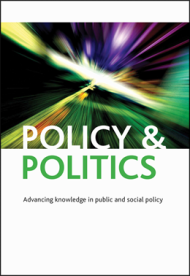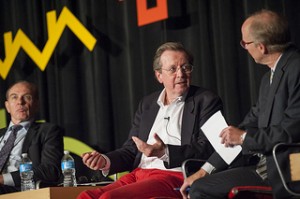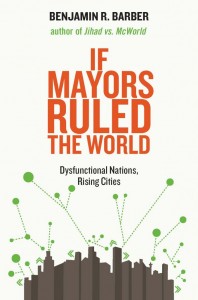 As part of the ESRC’s Festival of Social Science, a debate took place in Bristol on 9/11/15 on the impacts of directly elected mayors on cities, including contributions from Baroness Barbara Janke, former Leader of Bristol City Council and Member of the House of Lords, Thom Oliver, Political Scientist, UWE, David Sweeting, Senior Lecturer, University of Bristol, and Ben Harrison, Centre for Cities. A lively debate included reference to George Osborne’s plans for cities and city regions, and particularly whether we are witnessing a ‘devolution deception’.
As part of the ESRC’s Festival of Social Science, a debate took place in Bristol on 9/11/15 on the impacts of directly elected mayors on cities, including contributions from Baroness Barbara Janke, former Leader of Bristol City Council and Member of the House of Lords, Thom Oliver, Political Scientist, UWE, David Sweeting, Senior Lecturer, University of Bristol, and Ben Harrison, Centre for Cities. A lively debate included reference to George Osborne’s plans for cities and city regions, and particularly whether we are witnessing a ‘devolution deception’.
Here, Ben Harrison argues the case against such an interpretation.
To dismiss the Government’s devolution agenda simply as a “deception” is to opt out of a debate at the very time that real change is finally possible.
I was recently in Bristol earlier this week speaking about the merits of directly elected mayors, when I heard a familiar refrain during the audience Q and A. Far from being a significant redistribution of power from the central state to local areas, the Government’s entire devolution agenda, the attendee said, was nothing more than a “devolution deception”.
This is far from the only time I’ve heard this kind of critique put forward, not least from the national Labour party and its new leader, and earlier this week from the leader of the Liberal Democrats. But does it really stack up – is the Government really deceiving people when it comes to its intentions on devolution?
Let’s examine the biggest concerns that tend to underpin claims that devolution is but a fig leaf for other, hidden policy agendas.
- The Cities Bill does not specifically commit the Government to provide any additional powers to local government
A key part of the parliamentary opposition to the Government’s agenda has been that despite the rhetoric, the Devolution Bill does not identify a list of specific policies that will be devolved to a specific set of places, and therefore it won’t allow for the devolution of anything at all.
In fact, the opposite is the case. The Bill is a deliberately generic and enabling piece of legislation that essentially allows for the devolution of almost anything – housing, health, welfare, policing and more – to a local level, and allows for different settlements to be reached in different places depending on local appetite and capacity. The only limit on devolution under the model will be the willingness and ability of local and national politicians to reach agreement on what will be included. And of course the experience in London, where the powers of the GLA has grown significantly since the turn of the century, suggests this picture can and will change over time.
- The Government is driving this process from the top down
Yet despite the potential expansiveness of what is on offer, many still struggle to equate the current policy process with devolution because they see the Government setting the agenda and criteria for what will or won’t be devolved within the framework set by the Bill. If it’s a ‘top down process’, how could it possibly be devolution?
The major factor that has led to the current round of city-region deals, featuring more substantial devolution than previous attempts to decentralise, has been the active involvement of the Chancellor of the Exchequer. George Osborne has had to deploy his own substantial political capital to set clear criteria that must be met to achieve devolution, and most critically, in order to prise control away from Whitehall departments (including the Treasury) who instinctively look to control and constrain any moves to push power down from the centre.
That’s why it is not contradictory for the process of decentralisation to be set out and driven from the centre – in fact, in a country where central Government holds almost all the power, it is necessary if we are to see tangible progress made. In 21st Century Britain, the dominance of Whitehall departments, coupled with the lack of power held by UK cities, means that only the authority of the highest offices in the land can drive the devolution of real power to cities and city-regions across the country.
- The process has taken place entirely behind closed doors with no public scrutiny
A separate concern relates to the lack of transparency that has characterised the deals currently being negotiated between the Government and city-regions. Unlike in previous rounds of city and growth deals, proposals have not always been made public, and with goalposts shifting, councils have struggled to communicate to their communities and colleagues in the private sector what devolution will mean for their place.
These concerns are understandable and should be addressed as a priority in the months to come – indeed already places are engaging in more detailed consultations on new arrangements for their places. But it is also important to recognise that these deals are being negotiated by politicians at a national level with a manifesto commitment to do so, and locally elected politicians with a mandate to represent the interests of their constituents. Equally, while other approaches may have been possible, the reasons why the process has to date been undertaken in this way are also understandable.
The Government has deliberately eschewed setting out a ‘one-size-fits-all’ approach to devolution, and has encouraged places to come forward with their own proposals in time for them to be implemented during the coming Parliament. Agreeing these proposals requires political compromise and a willingness to take on, share, and give up different powers and responsibilities. The political reality is that these are often difficult and uncertain conversations that benefit from a degree of privacy, to allow for more honest and frank conversations to take place. It would be much harder, if not impossible, to conduct these negotiations in public.
- This isn’t about the devolution of power, but the devolution of budget cuts
Finally, and perhaps most significantly in terms of an accusation that the Government has a “hidden agenda” when it comes to devolution, is the issue of cuts to local government budgets. Many believe that the Chancellor is in essence giving a little with one hand, but taking dramatically more with the other, while leaving councils with the responsibility to deal with the consequences for public services.
There can be no doubt that local government has undergone significant resource reductions since 2010, and as we heard from the Chancellor this week, there will be more pain for the sector to come in this Parliament. Observers are right to suggest such moves signal a concerted effort to change the size and scope of the state, and that doing so raises profound questions regarding the future of public service provision. But to suggest this is some kind of hidden agenda is, I think, misjudged.
Firstly, the Chancellor advertises his ‘austerity credentials’ proudly – they are a key part of his own personal brand and no one can have been surprised that the forthcoming Spending Review will feature more cuts. Secondly, whether one agrees with the ambition or not (and many do not), I think the Chancellor sees devolution as a necessary and complementary factor required to deliver a smaller state. The thinking here is, yes budgets will be dramatically smaller in the future, but the ability of (and imperative on) local leaders to drive efficiencies and new models of public service provision will be enhanced. Of course this is a political and financial judgement, and the merits of it can and will be contested, but on the Chancellor’s terms at least, devolution is not a distraction from austerity, but actually goes hand in hand with it.
It is to be expected that many are suspicious of the impact devolution will have across the country, and that many remain sceptical regarding the Government’s commitment to truly give power away. We have, after all, been here many times before, and failed to see control wrestled away from the central state. Equally, given the scale of public spending cuts planned, concerns regarding the future provision of public services are also understandable.
Yet to dismiss the Government’s devolution agenda simply as a “deception” is to opt out of a debate at the very time that real change is finally possible. It’s true that the prizes on offer today may seem modest, particularly when compared to the kinds of powers wielded by cities in Europe or America. But after decades of centralisation, the real questions those with doubts about the current agenda should be asking is how can we make sure that the incremental reform that is on the table today is delivered; how do we ensure that places do have greater ability to shape the way in which the forthcoming cuts affect them; and how do we ensure that, bolstered by newly established city-region leadership across the country, the devolution deals of 2015 mark the beginning of the story, not the end.
This was first posted on the Centre for Cities blog.




 David Sweeting
David Sweeting

